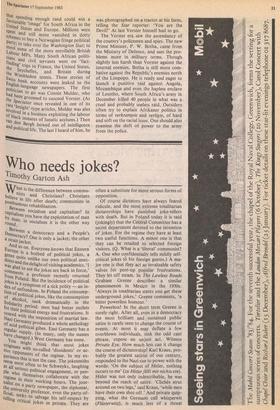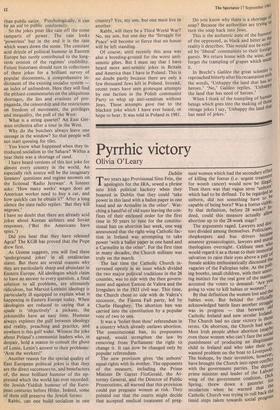_Who needs jokes?
Timothy Garton Ash What is the difference between commu- nists- and Christians? Christians believeinlife after death; communists in Posthumous rehabilitation. and capitalism? Between socialism sm? In by you have the exploitation of man uY man; in socialism it is the other way round. Between a democracy and a People's Democracy? One is only a jacket; a strait-jacket. the other And so on. Everyone knows that Eastern. Europe is a hotbed of political jokes, a genre quite unlike our own political anec- dotes and the delight of visiting academics. `I was glad to see the jokes are back in force,' comments a professor recently returned from Poland. But the incidence of political Jokes is a symptom of a sick polity — an in- dex of unfreedom. In Poland the consump- tion of political jokes, like the consumption of alcohol, sank dramatically in the Solidarity period: men had better outlets for their political energy and frustrations. It soared with the imposition of martial law. Nazi Germany produced a whole anthology regular supplyOf acid political gibes. East Germany has a . (In many, only the names have changed.) West Germany has none. You ori might think that most jokes ginate with so-called 'dissidents' or ac- tive opponents of the regime. In my ex- perience this is not the case. The jokesmiths seem most often to be Schweyks, laughing at all serious political engagement, or peo- ple who themselves collaborate with the regime in their working hours. The jour- nalist on a party newspaper, the diplomat, the university professor, even the party of- ficial, seeks to salvage by age his self-respect telling critical jokes in private. They are often a substitute for more serious forms of opposition. Of course dictators have always feared ridicule, and the most extreme totalitarian dictatorships have punished joke-tellers with death. But in Poland today it is said (jokingly) that the Central Committee has a secret department devoted to the invention of jokes. For the regime they have at least two useful functions. A minor one is that they can be retailed to selected foreign visitors. (Q. What is a 'liberal' communist? A. On e who confidentially tells mildly self- critical jokes to his foreign guests.) A ma- jor one is that they act as invaluable safety valves for pent-up popular frustrations. They let off steam. In The Lawless Roads Graham Greene describes a similar phenomenon in Mexico in the 1930s. 'Always in totalitarian states you get these underground jokes,' Greene comments, 'a bitter powerless humour.' Powerless! In the short term Greene is surely right. After all, even in a democracy the most brilliant and sustained public satire is rarely seen to change the course of events. At most it may deflate a few overblown individuals, sink the odd cant phrase, expose an unjust act. Witness Private Eye. How much less can it change the course of dictatorship! Karl Kraus, pro- bably the greatest satirist of our century, responded to the Nazi rise to power with the words: 'On the subject of Hitler, nothing occurs to me' (zu Hitler fall mit nichts em). Hitler was not only indescribable, he was beyond the reach of satire. 'Clichés strut around on two legs,' said Kraus, 'while men have their own shot off.' And private quip- ping, what the Germans call whisperwit (Flilsterwitz), is much less of a threat than public satire. Psychologically, it can be an aid to public conformity.
So the jokes pour like rain off the stone ramparts of power. The rain looks 'powerless' but in the end it is the rain which wears down the stone. The constant acid drizzle of political humour in Eastern Europe has surely contributed to the long- term erosion of the regimes' credibility. Future historians should turn to collections of these jokes for a brilliant survey of popular discontents, a comprehensive in- dictment of the existing socialist system — an index of unfreedom. Here they will find the pithiest commentaries on the ubiquitous shortages, the lies and evasions of pro- paganda, the censorship and the restrictions on freedom of movement, the privileges and inequality, the pull of the West: What is a string quartet? An East Ger- man orchestra after a tour in the West.
Why do the butchers always leave one sausage in the window? So that people will not start queuing for tiles.
You know what happened when they in- troduced socialism to the Sahara? Within a year there was a shortage of sand.
I have heard versions of this last joke for almost every country in the world. An especially rich source will be the imaginary listeners' questions and regime answers on the fictional 'Radio Jerewan'. A listener asks: 'How many weeks' wages does an American worker need to buy a car, and how quickly can he obtain it?' After a long silence the state radio replies: 'But they kill negroes.'
I have no doubt that there are already acid jokes about Korean airliners and Soviet responses. ('But the Americans have spies.') Did you hear that they have released Agca? The KGB has proved that the Pope drew first.
As Greene suggests, you will find these 'underground jokes' in all totalitarian states. But there are several reasons why they are particularly sharp and abundant in Eastern Europe. All ideologies which claim to have an answer to every question, a final solution to all problems, are ultimately ridiculous, but Marxist-Leninist ideology is particularly ill equipped to explain what is happening in Eastern Europe today. When ideologists are reduced to saying that a spade is 'objectively' a pickaxe, the jokesmiths have an easy time. Humour always explores the gulf between ideology and reality, preaching and practice, and nowhere is this gulf wider. Witness the joke about Poland's communist leaders who, in despair, hold a seance to consult the ghost of Lenin. Lenin's answer to their problems: 'Arm the workers!'
Another reason for the special quality of East European political jokes is that they are the direct successors to, and benefactors of, the most brilliant humour of the op- pressed which the world has ever recorded: the Jewish/Yiddish humour of the Euro- pean centuries before Hitler. Indeed, some of them still preserve the Jewish forms: Rabbi, can one build socialism in one country? Yes, my son, but one must live in another.
Rabbi, will there be a Third World War? No, my son, but one day the 'Struggle for Peace' will become so fierce that no house will be left standing.
Of course, until recently this area was also a breeding-ground for the worst anti- semitic gibes. But I must say that I have heard more anti-semitic jokes in Britain and America than I have in Poland. This is no doubt partly because there are only a few thousand Jews left in Poland. Instead, recent years have seen grotesque attempts by one faction in the Polish communist Party to whip up anti-semitism without Jews. These attempts gave rise to the blackest joke which I have ever heard, or hope to hear. It was told in Poland in 1981.
Do you know why there is a shortage of soap? Because the authorities are trying to turn the soap back into Jews. This is the authentic note of the humour of the oppressed, as black and bitter as Me reality it describes. This would not be retall. ed by 'liberal' communists to their foreign guests. We return home with the wine, and forget the trampling of grapes which made it. In Brecht's Galileo the great scientist. is reproached bitterly after his recantation With the words, 'Unhappy the land that has iln heroes.' No,' Galileo replies. 'UnhapPY the land that has need of heroes.'
When I think of the trampling of bunion beings which goes into the making of those vintage jokes I say, 'Unhappy the land that has need of jokes.'







































 Previous page
Previous page